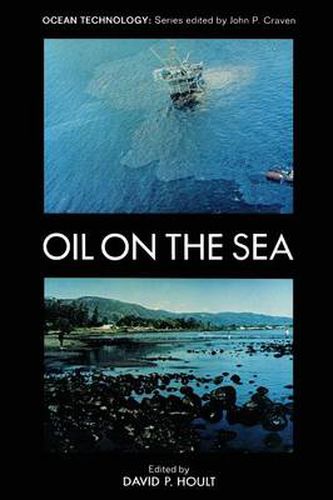Readings Newsletter
Become a Readings Member to make your shopping experience even easier.
Sign in or sign up for free!
You’re not far away from qualifying for FREE standard shipping within Australia
You’ve qualified for FREE standard shipping within Australia
The cart is loading…






This title is printed to order. This book may have been self-published. If so, we cannot guarantee the quality of the content. In the main most books will have gone through the editing process however some may not. We therefore suggest that you be aware of this before ordering this book. If in doubt check either the author or publisher’s details as we are unable to accept any returns unless they are faulty. Please contact us if you have any questions.
In the last decade, changes in the scale of operations required to find and transport oil have led to a pollution problem of major proportions: oil on the sea. These changes occurred slowly, and the change in magnitude of the possi bilities for . pollution went unrecognized until a series of dramatic accidents recently gave the problem wide-spread public notice. The Torrey Canyon and Santa Barbara episodes are discussed in this volume. The changes in the scale of oil operations stem from an ever increasing demand for energy. In response to this demand, oil drilling from offshore rigs on the continental shelf has been rapidly developed. To inexpensively trans port oil to the consumers of energy, huge supertankers, of ever increasing size, are being constructed. These ships effect economic savings at the expense of being relatively underpowered, and less maneuverable. Having very deep draft, they are constrained to operate on the high seas and the few deep harbors of the world. Every year there is more oil pumped from the sea floor. Every year more oil is trans ported over the sea. Approximately one tenth of one per cent of this oil each year is spilled on the sea. The purpose of the present volume is to provide a summary of our current understanding of the problem of oil on the sea. Before describing in detail the topics presented, it seems well to point out .
$9.00 standard shipping within Australia
FREE standard shipping within Australia for orders over $100.00
Express & International shipping calculated at checkout
This title is printed to order. This book may have been self-published. If so, we cannot guarantee the quality of the content. In the main most books will have gone through the editing process however some may not. We therefore suggest that you be aware of this before ordering this book. If in doubt check either the author or publisher’s details as we are unable to accept any returns unless they are faulty. Please contact us if you have any questions.
In the last decade, changes in the scale of operations required to find and transport oil have led to a pollution problem of major proportions: oil on the sea. These changes occurred slowly, and the change in magnitude of the possi bilities for . pollution went unrecognized until a series of dramatic accidents recently gave the problem wide-spread public notice. The Torrey Canyon and Santa Barbara episodes are discussed in this volume. The changes in the scale of oil operations stem from an ever increasing demand for energy. In response to this demand, oil drilling from offshore rigs on the continental shelf has been rapidly developed. To inexpensively trans port oil to the consumers of energy, huge supertankers, of ever increasing size, are being constructed. These ships effect economic savings at the expense of being relatively underpowered, and less maneuverable. Having very deep draft, they are constrained to operate on the high seas and the few deep harbors of the world. Every year there is more oil pumped from the sea floor. Every year more oil is trans ported over the sea. Approximately one tenth of one per cent of this oil each year is spilled on the sea. The purpose of the present volume is to provide a summary of our current understanding of the problem of oil on the sea. Before describing in detail the topics presented, it seems well to point out .